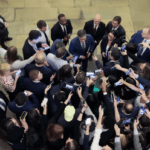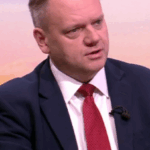A cracked windscreen forced US Secretary of State Marco Rubio to abandon his flight to the Munich Security Conference, returning to Andrews Air Force Base just an hour after takeoff. The incident delayed his arrival in Europe, where US foreign policy on Ukraine was already causing major diplomatic ripples.
Despite the mid-air scare, the real turbulence was unfolding elsewhere. US Defense Secretary Pete Hegseth had delivered a speech that stunned European allies, laying out what many saw as major concessions Ukraine might have to accept in a peace deal with Russia, under negotiations brokered by President Donald Trump.
Hegseth’s Remarks Spark Backlash
In his speech, Hegseth declared it was “unrealistic” for Ukraine to reclaim all its occupied territory or to expect NATO membership, arguing that European, not US troops, should be responsible for maintaining peace.
The comments triggered fierce criticism, including from Republican lawmakers, who argued Hegseth had weakened Ukraine’s position before negotiations even began.
“It’s certainly an innovative approach to a negotiation to make major concessions before talks start,” said Carl Bildt, former Swedish Prime Minister and co-chair of the European Council on Foreign Relations.
Amid mounting backlash, Hegseth attempted to clarify his remarks the next day, insisting that all options remained on the table for Trump.
“What the President decides to allow or not allow is at his discretion,” Hegseth said. “I was simply pointing out realism, not making concessions to Russia.”
Confusion Over US Policy
The mixed messaging from the administration continued in Munich. While Rubio’s team reassured allies that the US was committed to a “just and lasting peace”, Vice President JD Vance contradicted Hegseth’s earlier stance, saying the US could use military leverage to push Russia toward a deal.
Meanwhile, European leaders announced plans to meet in Paris on Monday to ensure their voices were heard in any future Ukraine peace talks.
In Washington, Trump faced questions about the growing fallout from Hegseth’s speech. A Republican senator had described it as a “rookie mistake”, likening it to something a pro-Putin analyst might have written.
When asked whether he had approved Hegseth’s remarks, Trump responded:
“Generally speaking, yeah, generally speaking I was aware,” before adding, “I’ll speak to Pete, I’ll find out.”
Signs of Disorganization or a New Strategy?
The series of contradictory statements over three days offered a first glimpse into Trump’s evolving stance on Ukraine—and how his administration is shaping its foreign policy.
Hegseth’s speech, combined with Trump’s warm phone call with Vladimir Putin, sent shockwaves through Europe. EU foreign policy chief Kaja Kallas warned against a US-brokered deal that sidelined Ukraine, saying:
“Any quick fix is a dirty deal.”
Beyond policy, the incident highlighted the chaotic nature of Trump’s foreign policy communications. Some analysts believe the confusion stems from a new administration still refining its positions, while others see it as a feature rather than a flaw—with Trump encouraging loyalty over policy consistency.
Hegseth’s Controversial Appointment
Hegseth’s appointment as Defense Secretary had been highly contested. A former Fox News host with no experience leading the military or government agencies, he aligned closely with Trump’s nationalist policies. His confirmation scraped through with a 50-50 Senate vote, requiring Vice President Vance’s tie-breaking vote.
Trump’s first term was marked by high-profile dismissals of officials who contradicted or challenged him, including three national security advisers, two defense secretaries, and a secretary of state.
This time, Trump’s inner circle appears more focused on loyalty—even if it means navigating an increasingly fractured foreign policy strategy.
















